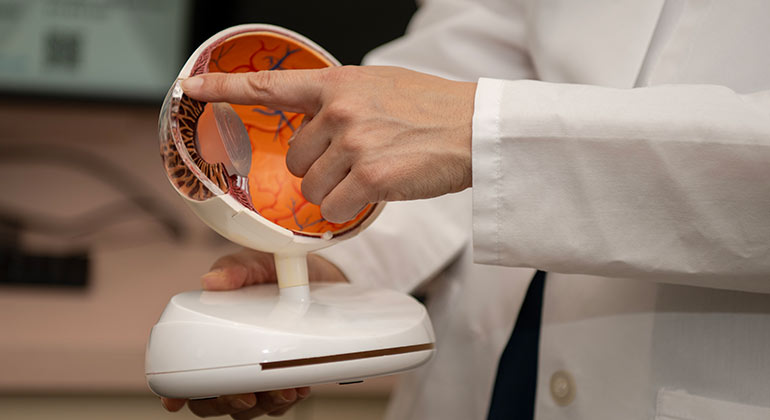
EVO Implantable Collamer Lens
Approved by the Food and Drug Administration in 2022, the EVO Implantable Collamer Lens (ICL) is an implantable lens that corrects vision without the need to remove any corneal tissue (as during LASIK and PRK or lens replacement). Instead, surgeons make a small incision in the eye to place a permanent, implantable contact lens, the ICL, on top of the existing lens. EVO ICL treats common vision issues such as nearsightedness (myopia) and astigmatism (blurry or distorted vision). It also enhances day and night vision without the need for eyeglasses or contact lenses. The EVO ICL procedure offers the following benefits:
- Fast recovery time.
- Minimal to no haze, glare, or halos.
- Minimal need for postoperative medications.
- It is safe and effective option if you are not a good candidate for LASIK or PRK.
- It is an option if you have severe nearsightedness and cannot be treated with LASIK.
- It offers the flexibility of removal unlike LASIK or PRK, which are permanent surgeries.
- Since the implant is placed over your natural lens, it can offer UV protection similar to sunglasses.
- The ICL is made from flexible collagen, which is highly biocompatible with the natural chemistry of the eyes.
Initial Consultation
The first step is meeting with your surgeon. They will perform a detailed eye exam, map the cornea, and perform refraction and lens calculations. They will also measure the curvature of the eye, and check corneal thickness, pupil size, tear production, and stability of the refractive error. These measurements will tell us how powerful a lens you need. You will need to stop wearing your contact lenses for at least two weeks prior to this appointment to ensure your eyes are in best condition for testing. Your surgeon will let you know if you are a good candidate for EVO ICL surgery. You should use this opportunity to ask questions and discuss any lifestyle changes you may need to make during your recovery.
Candidates
Good candidates for the ICL procedure meet the following conditions:
- Between ages 21 and 45
- Have a refractive error
- Have high prescription eyeglasses (or thick glasses) or contact lenses
- Have nearsightedness and astigmatism (blurry vision)
- Have thin corneas, dry eye syndrome, keratoconus (a cone-like bump on the cornea), and other eye condition that LASIK would not help
- Have a stable eye prescription (with documented evidence that your refraction did not change by more than 0.50 to 1.0 diopter during the last year)
- Have a job or participate in activities (like sports) where a corneal flap would be a problem
- Are not pregnant or nursing
ICL should not be performed on people with:
- Cataracts that affect vision
- An unstable (changing) refractive error
- A history of autoimmune disease (such as lupus) because it many of these patients heal poorly
Your ophthalmologist will be able to advise what procedure may be right for you based on your eye and overall health.
